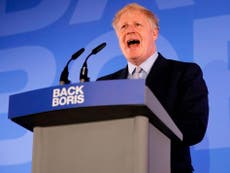Why we’re backing another march for a Brexit referendum and rallies across Britain
No-deal Brexit is off the table and no new prime minister can put it back there, no matter what excitement attaches to their appointment
In March, 1 million people took to the streets with us for the Put It To The People march and rally to demand that voters should have the Final Say on Brexit. Today we announce that further protests will reverberate across the UK this summer in a series of regional rallies, culminating in another mass march in London on Saturday 12 October.
The date is significant: it will be 19 days before – in the worst-case scenario – the democratic outrage of the UK being dragged out of the European Union without a deal by a maverick prime minister chosen by 0.25 per cent of the electorate in the Tory leadership contest.
Where is the mandate for that ending? About 60,000 Conservative activists voting for Boris Johnson, ahead of 40,000, say, plumping for Jeremy Hunt? Against the British electorate of 45.8 million people? It is obscene. It is humiliating for Britain. It cannot be allowed to happen.
Despite the arguments of most of those who put themselves forward for the Conservative Party leadership, the narrow verdict of the people in the flawed referendum of 2016 was not explicitly and unequivocally for a hard Brexit. The question put to the voters on the ballot paper was a simple binary one. It admitted no detail and no further interpretation. Now that we know far more about what Brexit actually does mean – beyond the empty sound bite of “Brexit means Brexit” – the people should be given an opportunity to approve it in a confirmatory referendum.
Some voters may well have voted in 2016 for a “clean” Brexit under World Trade Organisation rules. Others may have had in mind a much closer relationship with the EU, the kind of arrangement the Norwegians or Swiss enjoy. Others, of course, voted Remain. Others stayed at home. Others have since reassessed the prospects and changed their minds, in both directions. The polling tells many of these stories, but it is not enough by itself to divert the course of this country’s future. We cannot quantify these movements without a fresh vote.
Take a step back from the heat of the political meltdown in Westminster and it is remarkable that there are still arguments against a confirmatory referendum. It clearly is advisable to be absolutely sure before we take a decision of this magnitude. To do so without asking the people whether this is actually what they want would be reckless to say the least. If they vote for Brexit again, on known terms, then no one can or should argue with that. We called our campaign Final Say for a reason.
There is, then, a democratic imperative at work. It is true that a second referendum campaign could prove bitter and divisive, with cries of betrayal. But to crash out of the EU, leaving a generation who want to remain to deal with the chaos and consequences, would be deeply divisive too. Certainly, no one would wish to have another referendum for the sake of it, but the first was flawed because the true intent of the electorate has never been clear, because the meaning of Brexit has never been clear, though it is now crystallising.
The 2016 verdict has been so open to interpretation and misinterpretation – often for partisan purposes – that it cannot be relied upon now.
Would it be worth it? Yes, because whatever the passion aroused it does have that democratic imperative associated with it. Sovereignty shifted from parliament to the people in 2016, and for a prime minister and parliament to potentially defy the current will of the people by engineering a disastrous no-deal Brexit would destroy trust in democracy. More democracy – a confirmatory vote – will not destroy democracy.
Putting the European question back to the people also has the merit that it is the only logical way through the impasse. Not the least of the Alice-in-Wonderland aspects of the current Conservative leadership contest is that all of the leading candidates seem to think that no deal is an option that can be “put on the table”. Sometimes it is portrayed as an attractive option, by the likes of Esther McVey; sometimes it is viewed with visible distaste, as by Jeremy Hunt. Dominic Raab thinks he can prorogue parliament to force it through, while Boris Johnson sees it as a form of nuclear deterrent to persuade the Europeans that the UK means business – the threat of no deal meaning that a new deal will in fact be achieved.
In too many cases it is regarded by the leadership hopefuls as plausible. It is not.
As Rory Stewart and Matt Hancock have honestly acknowledged, no deal is in reality not an option. Further moves will follow in the House of Commons to rule it out. Where there is a will there is a way, and the speaker John Bercow has stated that he will defend parliament against any attempt to usurp its powers and prerogatives. There are many ways for the Commons to take back control of events, and MPs have shown their willingness to do so in the past. They will do so again. Nor is proroguing parliament a constitutionally sound way forwards.
The Queen is unlikely to follow the precedent last set by Charles I, who lost his kingdom and his head as a result. Ironically she is more of a democrat than Mr Raab. The palace will tell MPs, including the prime minister, to sort it out among themselves.
No-deal Brexit, then, is off the table and no new prime minister can put it back there, no matter what excitement is attached to their appointment. The European Union has repeatedly stressed that it cannot open the withdrawal agreement (which should probably be more accurately retitled the “withdrawal disagreement”).
There is one notable matter of logic, rather than horse-trading: until and unless a mutually acceptable solution to the Irish backstop conundrum has been discovered, no compromise can remove it.
Mr Johnson, eloquent as he is, will not be able to change what Theresa May couldn’t change. Even he cannot defy the laws of logic, and he cannot summon up a landslide majority for his plans out of a hung parliament full of enemies (behind him) and opponents (in front of him).
If parliament will not approve a no-deal Brexit, and indeed wishes to veto it now; if the withdrawal agreement cannot be altered; if there is no majority for a version of the existing Brexit package; and if the EU is reluctant to offer further extension, then further crisis lies ahead. The choice will be to break the deadlock via general election or a fresh referendum.
A general election would solve nothing because it would be fought on a range of issues and in all likelihood return another hung parliament, with the same divisions and the added bonus of a few Brexit Party MPs and Nigel Farage to make a bad situation worse.
A Final Say referendum would have the benefit of giving the country at least the chance of closing down this interminable debate and healing its wounds. Mr Johnson, from what we know of his risk-taking ways, might even fancy his chances of winning in another referendum. We also know he is capable of radical changes of mind and direction when he feels it suits the career interests of the Rt Hon Alexander Boris de Pfeffel Johnson MP. Like his hero Churchill, he is capable of nimble manoeuvres.
It is probably safe to say we won’t see Mr Johnson at the Final Say rallies or the march, though he would be welcome. Indeed, he may yet go for the option of a referendum with no deal on the ballot. Stranger things have happened. If not, then parliament will have to seize the initiative and put the question of Brexit back to the people – as they are increasingly demanding.




Join our commenting forum
Join thought-provoking conversations, follow other Independent readers and see their replies